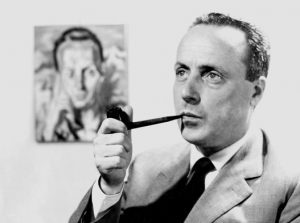ITALIAN PORTRAITS Giorgio Bassani. Each Book, a New Life
“In life, if one wants seriously to understand how the world works, he must die at least once” (Garden of the Finzi-Continis, 1962). And die more than once was what Giorgio Bassani did, if you consider each book a new life. Born in Bologna in 1916, Bassani became best known for his short stories and novels, especially those set in the town in which he spent his childhood, Ferrara. Bassani was an Antifascist whose politics shine through in much of his writing. The Garden of the Finzi-Continis (1962), winner of the prestigious Premio Viareggio literary prize, is his most well-known novel: a semi-autobiographical work that tells the story of two Jewish families, middle-class and upper-class, during the Fascist period.
Though born in Bologna, Bassani grew up in the northern provincial city of Ferrara. The first in his family to forgo a career in medicine, he became a teacher in 1940. Forced to teach in a Jewish-only school following the passage of the Italian Racial Laws (1938), which forbade Jews to study or teach in any public institution, Bassani’s pedagogical style differed from those of his colleagues, with a focus on freedom and contemporary literature. As the war began and dragged on Bassani continued to teach, though to a dwindling student body, but was eventually arrested for his Antifascist views. In August 1943, shortly after his arrest and months-long imprisonment, Giorgio Bassani married Valeria Sinigallia (whom he had met at the Ferrara tennis club), fled Ferrara and went into hiding, first in Florence then in Rome, until the end of the war, continuing to write clandestinely.
His career as a novelist began in 1940, chronicling the lives of Italians, both Jews and Christians, from the 1920-40’s. His stories cast a critical eye on the Fascist movement and the persecution of Jews and other undesirables, including homosexuals (as in the minor masterpiece, The Gold-Rimmed Spectacles, 1958). After the war, his career started to really take off. He rose in notoriety in 1948 when asked to become the chief editor of the international literary journal, Botteghe Oscure. His specialty would prove to be finding unknown authors and introducing them to Italy, with a knack for identifying those who would succeed.
Bassani continued to promote young and unknown authors through his role as editorial director for the important Feltrinelli publishing house. He also became involved in movies as a writer and actor, although he was famously (and quite publicly) dissatisfied with Vittorio De Sica’s film adaptation of his novel, The Garden of the Finzi-Continis, which won the Oscar for Best Foreign Film in 1971. Bassani was later vice-president of Italian state television RAI, and founder of the important Italian historical association, Italia Nostra. He contributed greatly to the literary and cultural accomplishments of Italy. His influence in society was great, and his novels, stories and poetry help many to understand the war and the psychology and politics of Italians during that time. He died in April 2000, in Rome at the age 84.
*Sabina Muccigrosso is a student at Muhlenberg College (Allentown, Pennsylvania, USA).

